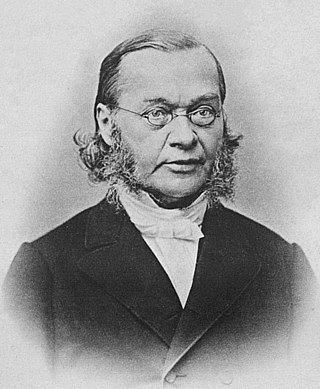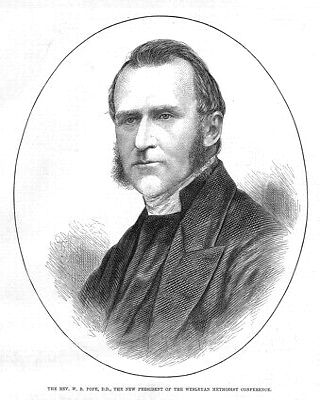
Rudolf Ewald Stier (17 March 1800 – 16 December 1862), was a German Protestant churchman and mystic.

Rudolf Ewald Stier (17 March 1800 – 16 December 1862), was a German Protestant churchman and mystic.
Stier was born at Fraustadt (Wschowa) in South Prussia and studied at the University of Halle and Humboldt University, Berlin, first law and afterwards theology; he continued his theological studies later at the pastoral seminary of Wittenberg. In 1824 he was made professor at the Missionary Institute in Basel. Afterwards he held pastorates at Frankleben near Merseburg (1829) and at Wichlinghausen (now part of Wuppertal) (1838). In 1850 he was appointed superintendent at Schkeuditz, and in 1859 at Eisleben.
He died at Eisleben.
Stier published a new edition of Martin Luther's Catechism and a translation of the Bible based on that of Luther; but he is noted chiefly for his thoughtful, devotional and mystical commentary on the Words of the Lord (Reden des Herrn, 3 vols., 1843; Eng. trans., 8 vols., 1855–1858).
He wrote commentaries on the Psalms, Second Isaiah, Proverbs, Ephesians, Hebrews, Epistles of James and Jude. His other works include: Die Reden der Apostel (2 vols, 1824–1830; Eng. trans., 1869) and Die Reden der Engel in den heiligen Schrift (1862). Cf. J. P. Lacroix, The Life of R. Stier (New York, 1874).

Ernst Wilhelm Theodor Herrmann Hengstenberg, was a German Lutheran churchman and neo-Lutheran theologian from an old and important Dortmund family.

Julius Müller was a German Protestant theologian.

Wilhelm Martin Leberecht de Wette was a German theologian and biblical scholar.
Karl Rudolf Hagenbach was a Swiss church theologian and historian. He was particularly interested in the Protestant Reformation and its figures.

Georg Heinrich August Ewald was a German orientalist, Protestant theologian, and Biblical exegete. He studied at the University of Göttingen. In 1827 he became extraordinary professor there, in 1831 ordinary professor of theology, and in 1835 professor of oriental languages. In 1837, as a member of the Göttingen Seven, he lost his position at Göttingen on account of his protest against King Ernst August's abrogation of the liberal constitution, and became professor of theology at the University of Tübingen. In 1848, he returned to his old position at Göttingen. When Hanover was annexed by Prussia in 1866, Ewald became a defender of the rights of the ex-king. Among his chief works are: Complete Course on the Hebrew Language, The Poetical Books of the Old Testament, History of the People of Israel, and Antiquities of the People of Israel. Ewald represented the city of Hanover as a member of the Guelph faction in the North German and German Diets.
Christian Hermann Weisse was a German Protestant religious philosopher and professor of philosophy at the University of Leipzig. He was the son of theologian Christian Ernst Weisse (1766–1832).

Ewald Christian von Kleist was a German poet and cavalry officer. His vast family was well-established in Farther Pomerania; 58 male members of his family fought in Frederick the Great's army of the Seven Years' War. Kleist was born at Zeblin, near Köslin (Koszalin) in Farther Pomerania, to the von Kleist family of cavalry leaders.

Rudolf Christoph Eucken was a German philosopher. He received the 1908 Nobel Prize in Literature "in recognition of his earnest search for truth, his penetrating power of thought, his wide range of vision, and the warmth and strength in presentation with which in his numerous works he has vindicated and developed an idealistic philosophy of life", after he had been nominated by a member of the Swedish Academy.
Eduard Karl August Riehm was a German Protestant theologian.

Abraham Kuenen was a Dutch Protestant theologian.

Karl Theodor Keim was a German Protestant theologian.
Friedrich Bleek, was a German Biblical scholar.

William Burt Pope was an English Wesleyan Methodist minister and theologian, who was president of the Methodist Conference.

Pius Zingerle was an Austrian Orientalist.

Bernhard Weiss was a German Protestant New Testament scholar. He was the father of Johannes Weiss and the painter, Hedwig Weiss.

Martin Luther was a German priest, theologian, author, hymnwriter, professor, and Augustinian friar. Luther was the seminal figure of the Protestant Reformation, and his theological beliefs form the basis of Lutheranism. He is widely regarded as one of the most influential figures in Western and Christian history.
This is a selected list of works by and about Martin Luther, the German theologian. The emphasis is on English language materials.

August Wilhelm Karl Knobel was a German Protestant theologian born in Tzschecheln near Sorau, Niederlausitz.

Stephan Agricola was a Lutheran church reformer. Born in Abensberg, at a young age he joined the Augustinian order. As a monk, he studied Augustine deeply. As a student, he went to the universities in Bologna and Venice, where in 1519 he became a Doctor of Theology. He began to preach on whole books of the Bible in 1520. He was led to Lutheranism through his study of Augustine's works on the scriptures. He was accused of Lutheranism as a heresy. Although he claimed his independence of Luther, he was arrested and imprisoned in Mühldorf on November 17, 1522. In 1523 he escaped and came to Augsburg, where with Urbanus Rhegius he fully accepted the Reformation and translated Johannes Bugenhagen's tract ag. Zwingjli into German. He was on the Lutheran side during the Marburg Colloquy, became pastor in Hof in 1532, took part in the meeting at Schmalkalden in 1537, and signed the Smalcald Articles. He was instrumental in introducing the Reformation in the Upper Palatinate, as he was pastor at Sulzbach beginning in 1542. During the Schmalkaldic War, he had to flee to Eisleben, where he died in old age on April 10–11, 1547. Stephen Agricola was a staunch uncompromising Lutheran, earnest and devoted. His son, Stephen, translated some of Luther's commentaries on the minor prophets.
Karl Gottfried Wilhelm Theile was a German theologian.